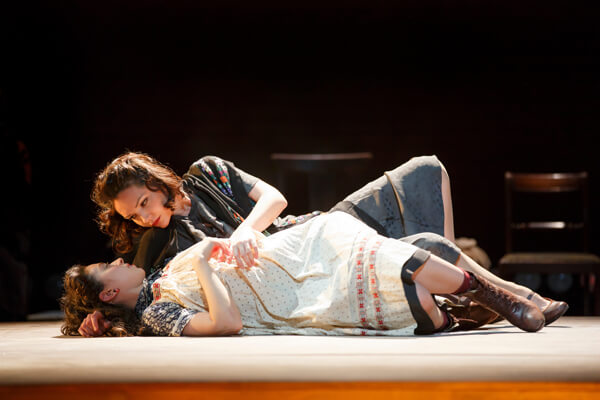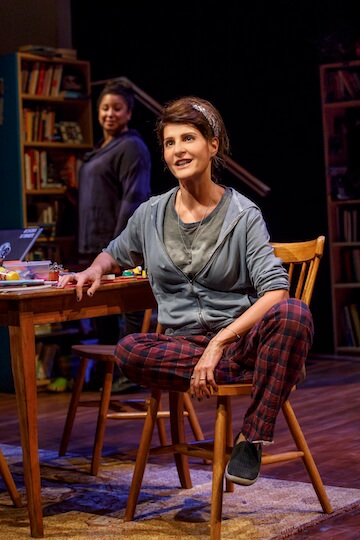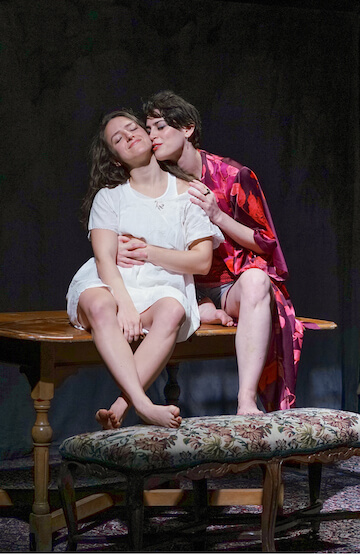Pulitzer Prize-winning playwright Paula Vogel. | LAURIE STURDEVANT
A beaming Paula Vogel greeted me with the biggest smile imaginable when I met to talk to her about her latest show, “Indecent,” which deals with Sholem Asch’s controversial 1906 play “God of Vengeance,” and also happens to be her Broadway debut, after 50 years in the theater.
Despite her Pulitzer Prize, formidable reputation, personal warmth, and radiant intelligence, Vogel instantly puts you at ease. Asked what drew her to this subject, she said of the century-old Asch play, “There is actually a community of people who have somehow or other come upon this little play and become a little obsessional about it, a play that should not be forgotten. I came upon it in my first year in graduate school. My professor looked at me — obviously I was in my butch days then — and he said, ‘There’s a play I want you to read. It’s called “God of Vengeance.”’ I raced to the library found a copy, out of print, a 1912 English translation, and I could not put it down.”
“God of Vengeance” concerns a Jewish brothel owner living above the brothel who is using the proceeds of his business to raise a pure, innocent daughter and buy her a place in society. The hitch is that she falls in love with a prostitute downstairs. Imagine this back in 1906 and a what a storm it created the following year when it was first produced in Warsaw’s Yiddish theater. Yet it was a critical hit and traveled around the world — reaching Broadway in 1923.
Pulitzer Prize winner’s backstory of notorious, century-old Yiddish lesbian love story
“It finally makes it to New York, in Yiddish, and it runs in rep on the Lower East Side, where it runs for years,” Vogel said. “The reason I really became transfixed is the entire second act is the love scene between the two women. I’m 64 years old, and I have rarely read anything that approaches the beauty of this play and kept thinking how could a young married man write this? It approaches lesbian love as if it were ‘Romeo and Juliet,’ the purest thing in the world, that their love can redeem a sinful world. At that point, I had been reading the gay and lesbian pulp novels of the late 1950s, which always ended with ‘Steve’ crying, ‘What’s wrong with me? Why can’t I be normal?!’ or a gunshot. But this ends, maybe not happily, but without an apology for the love between two women. Astonishing. I read this at 22 and thought ‘Ohmigod!’
“When it was performed on Broadway in 1923, it became a footnote of theater history as the first kiss between two women on the stage. The entire cast and producer were arrested for obscenity and put in jail, and it became a notorious obscenity trial. Then I heard about this younger woman director, Rebecca Taichman, who, while in grad school at Yale, decided to try and stage the obscenity trial as her thesis as a director. I thought, ‘Who is this woman? Ohmigod!’ It was like finding someone else who loves ‘Star Trek.’
“I started tracking her, saw many of her productions and thought she was remarkable. So, in 2007, I get a phone call and this woman — Rebecca — says, ‘Paula Vogel! I can’t believe I’m getting to talk to you! I know this is farfetched, but would you want to work with me about a play about ‘The God of Vengeance’ censorship trial?’ I said, ‘I think it it’s a larger story than that. Are you okay with that?’
“She said, ‘Yes. It can be anything you want.’ I said, ‘I think we have to tell the entire story.’ It took me 10 seconds to say yes, and we’ve been working together ever since.”
“Indecent” is actually the backstory of that play.
“My original title was ‘Rehearsal of Vengeance,’ until Doug Wright, God bless him, came along and asked, ‘What about quoting the original obscenity indictment?’ We show the play going all over the world in different time periods with the same cast, who keep performing the same scenes but having different political arguments. Is this about the love between women or what it means to be Jewish, etc.
Adina Verson, Katrina Lenk in the upcoming Broadway production of Paula Vogel’s “Indecent.” | CAROL ROSEGG
“The original indictment said that they had been arrested for producing an ‘obscene, immoral, impure, and indecent play, exhibition, or drama,’ and that’s how it became ‘Indecent.’ It starts with a theater troupe that literally comes back to life as it performs all over the world because they need to tell this story. We follow them all the way back to 1923, and it’s also about the different guises of censorship and how this came to be a perfect storm, as America decided to shut its borders to refugees from European massacres. Does this ring a bell? There was false news being planted by Henry Ford and government officials then, but I did not expect it to be this pertinent to what’s happening now. We have to look at censorship, homophobia, and being anti-immigrant and remember how fear and ignorance took over this country in such a way as to create genocide — and how they keep on creating on it.
“That said, it’s also funny. We have a klezmer band and period music written by Aaron Halva and Lisa Gutkin, the violinist for the Klezmatics, that is beautiful, erotic, haunting, and fun. It’s really just one step away from being a musical, which I’ve always wanted to write.” (Vogel told this writer about a recent, very high profile — and to me, quite disappointing — show she was hired for, but left after differing creative visions. But she swore me to secrecy as to its title.)
She continued, “I’ve done more rewrites on this than on anything I’ve ever done, and, willingly, because once we brought in the musicians and David Dorfman to do choreography and all these others, I feel like I wanted to get it as right as I possibly could. We’ve been very lucky to have had three productions before this one, including a Sundance lab. God bless Robert Redford, that was an amazing gift.”
I find it intriguing — and dear — that Vogel’s spouse, Anne Fausto-Sterling, is, like her, a professor at Brown University.
Describing their meeting, Vogel said, “Like all of us, I walked into a party and saw her across the way. She was married at the time and it was a dinner party to introduce me to the faculty. She walked in and I went, ‘Oh God, be still my heart!’ Then someone said, ‘Too bad your husband couldn’t come,’ and I went, ‘Ohhh, so that’s why God created cold showers! I have to walk across the campus, and I’m going home and doing just that!’
“So, four years later… the greater the delay, the greater the delight. We actually got married as soon as it was legal in Massachusetts. Her mother who was blind, deaf, and on oxygen and called herself either my mother-out-law or mother-in-law, and she had started saying, ‘Please get married soon because I want to join your hands.’ I loved her, and we both wanted that too, and then very fortunately, we had her for another seven years, so we were lucky.
They were married at the Truro Yacht Club on Cape Cod.
“It sounds grander than it is, this little scrappy barn, a scraggly place right in the harbor,” Vogel said. “We had a hundred friends, had them sing and play and do readings of our favorite poetry. It was sort of a Quaker-style ceremony. Anybody could get up and say whatever they wanted. Sometimes you wanted to say, ‘Okay, that’s enough, but it was great!
“When I first met Ann, she’d been married to the same man for 22 years and she said, ‘I don’t think I can live in the same apartment. So we got a multi-family place and I lived on the first floor and she lived on the top floor, and we used the middle floor for dinner and for friends to have a place to stay. We did it for 10 years and I thought it was great, perfect. I also said to her, which is really true, ‘As a biologist and scientist, you need to stay put in the library for your research. I’m a playwright. You’re never going to see me. I’m traveling and not coming home except to do my dry cleaning once a month!’
“The great thing was that a number of our gay friends came to the wedding and shortly thereafter decided to get married. It’s a negotiation rite and, while I completely understand people who say they’re not interested in it, I also want the least state control as possible over me and my relationship. If I don’t marry, there is no control in terms of taking care of this woman I love, being able to visit her in the hospital, or whatever. It’s craziness, what you go through if you don’t.”
I’ve always considered playwriting the hardest kind of writing to do, because of it’s being driven by dialogue, but Vogel disagreed.
“I don’t think so. I mean, some plays are driven by spectacle, character, as well as language. Some plays just have to tell a story. It’s also about what’s not spoken. I have often thought of it as a way of not writing: you let the actors fill it in.
“I’ve done 40 years of workshops with people who have written extraordinary short plays and many have then gone on to become playwrights. I just want to say that if you give me a week in a room of incredible people with very different life experiences, anyone would be stunned by their plays and become believers in theater. That’s how I’ve kept on being a playwright and being in the theater for 50 years.
“I started a program in prison for women in maximum security. I spent a year working with veterans from Afghanistan, Vietnam, and Iraq, and the plays they wrote stunned people. It’s no surprise they have things I need to hear. Here’s what we do in this country: education is actually a process of unlearning. We are all artists when we’re five years old. We can all sing, dance, and tell stories. But by the time we’re in middle school, we’re all, ‘I can’t sing. I can’t play an instrument. I’m not a writer.’ It’s a self-censorship.”
Vogel won the Pulitzer in 1998 for her play “How I Learned to Drive.”
“That was kind of like going to Broadway for me now. I was in a little bit of a state of shock. I still am. I thought I’d had a high fever and would wake up in bed like Dorothy with my wife and friends bending anxiously over me, looking for signs of concussion in black and white.
“A couple of friends had said, ‘You’re gonna win,’ and I said, ‘Don’t say that!’ I’m not the first lesbian to win a Pulitzer, that was Marion Morehouse for poetry. I’m the first out lesbian . The most phenomenal thing I saw was a newspaper, glaring in kind of National Examiner big red letters: ‘Lesbian Wins Pulitzer,’ like ‘Mom Bears Twins with Two Heads.’ That just made me roar with laughter.
“The thing that was hard was that my mother died before it happened. Every milestone we have I think, ‘What would it be like for those we’ve lost to know they could marry, to march with them again.”
INDECENT | Cort Theatre, 138 W. 48th St. | From Apr. 4: Tue at 7 p.m.; Wed.-Sat. at 8 p.m.; Sat. at 2 p.m.; Sun. at 3 p.m. | $49-$199 at Indecentbroadway.com
Read David Kennerley’s review of the New Yiddish Rep’s recent revival of “God of Vengeance.”




































